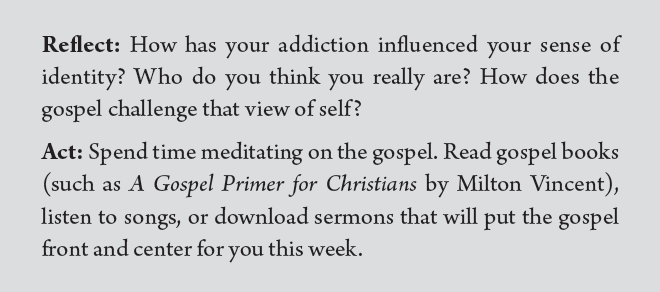DAY 1
Shame, Identity, and Change
Therefore, if anyone is in Christ, he is a new creation. The old has passed away; behold, the new has come. (2 Cor. 5:17)
What defines you most? Is it your job, your fears, the opinions of others, or, worst of all, your addiction? Does your addiction shape your identity more than anything else? Addictions never stay at the level of behavior. Instead, they strike at our sense of self. The deeper we go into an addiction, the more we may feel that we become it.
Paul Tripp explains: “The longer we struggle with a problem, the more likely we are to define ourselves by that problem (divorced, addicted, depressed, co-dependent, ADD). We come to believe that our problem is who we are. But while these labels may describe particular ways we struggle as sinners in a fallen world, they are not our identity! If we allow them to define us, we will live trapped within their boundaries.”*1 Addictions say, “This is who you are, and you’ll never change.”
Addictions impact our identity in two ways. First, an addiction requires us to give up significant parts of our life. We abandon dreams, jobs, family ties, moral convictions, and more. The deeper an addiction goes, the greater the sacrifices become. As a result, significant parts of self are lost in pursuit of addictive habits. Second, the deeper into an addiction we go, the less willing we are to be vulnerable and open to others. We fear exposure. Identity is formulated in relationship with others, but the addict misses this key element.
Your addiction defines you. Who you are becomes synonymous with what you do. One evidence of this is the shame you begin to feel, which signals that you have formed your identity around your addiction. You feel shame because you hate yourself. The deeper your experience of shame, the more hopeless you tend to feel about the possibility of change. The result is that you are less willing to fight your addiction.
But there is hope through Christ. Yes, you are a sinner; but in the gospel you are forgiven. In Christ, your identity has been re-formed, so that now you are not a sinner, not an addict, not an alcoholic. First and foremost, you are a Christian. Shame is dismantled in Christ, because he gives a new identity. “Therefore, if anyone is in Christ, he is a new creation.” You no longer are what you once were. “The old has passed away; behold, the new has come.”
Shame says, “I am my addiction.” Your emotions tempt you to believe that lie. Christ takes that identity from you and gives you a new one. Your identity is grounded in his victorious work, not in your failure. It is grounded in his triumph over sin, not in your struggle with sin. In him, you may still struggle, but there is hope of freedom because you are not defined by your struggle. You are defined by your relationship to him!
*1 Paul David Tripp, Instruments in the Redeemer’s Hands: People in Need of Change Helping People in Need of Change (Phillipsburg, NJ: P&R, 2002), 260.
Excerpt taken from Addictive Habits: Changing for Good by David R. Dunham



Comments